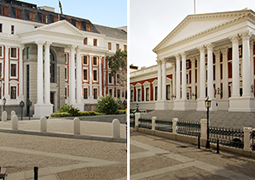
The Southern African Development Community Parliamentary Forum (SADC-PF), in collaboration with civil society organisations and health experts, held today an informative session on the role of parliaments in advancing sexual and reproductive health in southern Africa.
The theme of the virtual meeting of the forum’ Standing Committee on Human and Social Development and Special Programmes was “The role of parliamentarians in advancing the rights to bodily autonomy and integrity for Sexual and Reproductive Health Rights (SRHR) in SADC”.
The session was facilitated by Ms Felicita Hikuam, the Director of the Windhoek-based Aids and Rights Alliance for Southern Africa (Arasa), which operates in 18 countries across the continent. She said parliamentarians must use their oversight role to hold the executive accountable on policies and budget that could improve SRHR in their respective countries. “Parliamentarians can also use their power to influence public opinion to dispel taboos on sexual and reproductive health in their countries”, she said.
Dr Natasha Kaoma is a global sexual and reproductive health champion and also director of Copper Rose Zambia, an NGO that teaches women and girls about the importance of sexual and reproductive health. Dr Kaoma delivered a presentation on how parliamentarians from the SADC region can apply the principles of bodily autonomy and integrity (BAI) to advance sexual and reproductive health rights.
“The right to autonomy of our bodies means we have the power and agency to make choices without fear of violence or having someone else decide for us. It means deciding whether, when or with whom to have sex, and the right to decide whether you want to get pregnant,” Dr Kaoma.
The Lusaka-based expert said that parliamentarians should promote sexual and reproductive health and should this should include access to contraceptive information and services, termination of pregnancy as well as post termination care services and maternal healthcare.
Also included in SRHR are the prevention and treatment of HIV, comprehensive sexuality education, violence against women and girls and the rights of marginalised populations, particularly adolescents, sex workers and the LGBTQI community.
Dr Kaoma also told the session that some governments were afraid to fully invest in sexual and reproductive health due to fear of backlash from cultural and religious groups. “In countries where induced termination of pregnancy is restricted by law or otherwise unavailable, safe termination of pregnancy is a privilege for the rich, and in countries where it is completely banned or only allowed to save the women’s life, there’s often an increase in the occurrence of unsafe abortions,” she said.
She called for the introduction of comprehensive sexuality education in the curriculum as part of life skills development, arguing that this will reduce risky sexual behaviour. “Let us speak about the children that we have and not the angels that we want. Let’s give them enough information to protect them from unwanted pregnancy and HIV/Aids. We also need to target men in maternal health programmes as an entry point to encourage them to be more involved in their partner’s health as well as their own.”
SADC-PF and Arasa have a long-standing collaboration focused on supporting parliamentarians in the region to fulfil their role in addressing health challenges relating to HIV, sexual and reproductive health, and human rights.
Sakhile Mokoena
9 July 2021

